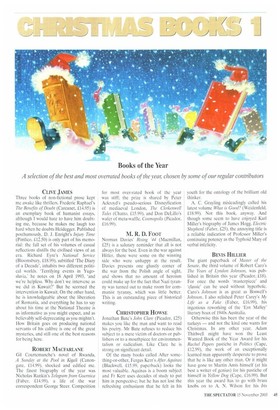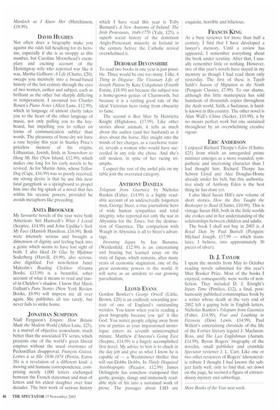Books of the Year
A selection of the best and most overrated books of the year, chosen by some of our regular contributors CLIVE JAMES Three books of non-fictional prose kept me awake like thrillers. Frederic Raphael's The Benefits of Doubt (Carcanet, £14.95) is an exemplary book of humanist essays, although I would hate to have him doubting me, because he makes me laugh too hard when he doubts Heidegger. Published posthumously, D. J. Enright's Injury Time (Pimlico, £12.50) is only part of his memorial: the full set of his volumes of casual reflections distills the civilised views of an era. Richard Fyre's National Service (Bloomsbury. £18.99), subtitled 'The Diary of a Decade', inhabits two different political worlds. 'Terrifying events in Yugoslavia,' he notes on 18 April 1993, 'and we're helpless. Why don't we intervene as we did in Kuwait?' But he scorned the intervention in Kuwait. On the other hand, he is knowledgeable about the liberation of Romania, and everything he has to say about his time at the National Theatre is as informative as you might expect, and as believably self-deprecating as you mightn't. How Britain goes on producing national servants of his calibre is one of the great mysteries, and still one of the best reasons for being here.
ROBERT MACFARLANE Gil Courtemanche's novel of Rwanda, A Sunday at the Pool in Kigali (Canongate, £14.99), shocked and edified me. The finest biography of the year was Nicholas Rankin's Telegram from Guemica (Faber, £14.99), a life of the war correspondent George Steer. Competition
for most over-rated book of the year was stiff; the prize is shared by Peter Ackroyd's pseudo-serious Disneyfication of mediaeval London, The Clerkenwell Tales (Chan°. £15.99), and Don DeLillo's wafer of meta-waffle. Cosmopolis (Picador, £16.99).
M. R. D. FOOT Norman Davies' Rising '44 (Macmillan, £25) is a salutary reminder that all is not always for the best. Even in the war against Hitler. there were some on the winning side who were unhappy at the result. Davies presents one ghastly corner of the war from the Polish angle of sight, and shows that no amount of heroism could make up for the fact that Nazi tyranny was turned out to make room for communist tyranny, which was little better. This is an outstanding piece of historical writing.
CHRISTOPHER HOWSE Jonathan Bate's John Clare (Picador, £25) makes you like the man and want to read his poetry. Mr Bate refuses to reduce his subject to a mere victim of doctors or publishers or to a mouthpiece for environmentalism or radicalism. Like Clare he is strong on significant detail.
Of the many books called After something-or-other, Fergus Kerr's After Aquinas (Blackwell. £15.99, paperback) looks the most valuable. Aquinas is a boom subject and Fr Kerr uses decades of study to put him in perspective; but he has not lost the refreshing enthusiasm that he felt in his youth for the ontology of the brilliant old thinker.
A. C. Grayling misleadingly called his latest volume What is Good? (Weidenfeld, £18.99). Not this book. anyway. And though some seem to have enjoyed Karl Miller's biography of James Hogg, Electric Shepherd (Faber, £25), the annoying title is a reliable indication of Professor Miller's continuing potency as the Typhoid Mary of verbal infelicity.
BEVIS HILLIER The giant paperback of Master of the Senate, the third volume of Robert Caro's The Years of Lyndon Johnson, was published in Britain this year (Picador, £18). For once the words 'masterpiece' and 'classic' can be used without hyperbole. Caro's Johnson is as great as Boswell's Johnson, I also relished Peter Carey's My Life as a Fake (Faber, 116.99), his ingenious reworking of the 'Ern Malley' literary hoax of 1940s Australia.
Otherwise this has been the year of the turkeys — and not the kind one wants for Christmas. In any other year, Adam Thirlwell might have won the Least Wanted Book of the Year Award for his Rachel Papers pastiche in Politics (Cape, £12.99), the work of an exceptionally learned man apparently desperate to prove that he is like any other man. Or it might have gone to Martin Amis himself (at his best a writer of genius) for his pastiche of himself in Yellow Dog (Cape, £16.99). But this year the award has to go with brass knobs on to A. N. Wilson for his Iris
Murdoch as I Knew Her (Hutchinson, £18.99).
DAVID HUGHES Not often does a biography make you against the odds fall headlong for its heroine, especially if she is as stroppy as this number, but Caroline Moorehead's exemplary and exciting account of the Hemingway wife who reported war like it was, Martha Gellhom: A Life (Chatto, £20), sweeps you incisively into a broad-based history of the last century through the eyes of two women, author and subject, each as brilliant as the other but sharply differing in temperament. I savoured too Charles Rosen's Piano Notes (Allen Lane, £12.99), which in language of utmost clarity takes you to the heart of the other language of music, not only pulling you to the keyboard, but impelling you to reflect on forms of communication subtler than words. The pleasures of bone-dry wit have a rare heyday this year in Stanley Price's priceless memoir of his origins, Lithuanian, Jewish, Irish, in Somewhere to Hang My Hat (New Island, £12.99), which makes one long for his early novels to be revived, As for Martin Amis, whose Yellow Dog (Cape, £16.99) was so poorly received, my strong desire is that he use this near fatal gangplank as a springboard to propel him into the big splash of a novel that lies within his oceanic powers, provided he avoids metaphors like preceding.
ANITA BROOKNER My favourite novels of the year were both American: Sin i Hustvedfs What I Loved (Sceptre. £14.99) and John Updike's Seek My Face (Hamish Hamilton. £16.99). Both were intensely serious and brought a dimension of dignity and feeling back into a genre which seems to have lost sight of both. I also liked Dr Glas by Hjalmar Soderberg (Harvill, £9.99), also serious, also dignified. For non-fiction Janet Malcolm's Reading Chekhov (Granta Books, £13.99) is a beautiful, sober account of what it means to read and travel in Chekhov's shadow. I know that Mavis Gallant's Paris Stories (New York Review Books, £9.99) will impress me all over again. She publishes all too rarely, but never fails to strike home.
JONATHAN SUMPTION Niall Ferguson's Empire: How Britain Made the Modern World (Allen Lane, £25), is a marvel of objective iconoclasm, much better than the associated TV series, which presents one of the world's great liberal empires without the usual overtones of Pecksniffian disapproval. Francois Guizot, Lettres a sa fille 1836-1874 (Perrin, Euros 38) is a revelation of a different kind: a moving and humane correspondence, comprising nearly 1,000 letters exchanged between the French statesman and man of letters and his eldest daughter over four decades. The best work of serious history which I have read this year is Toby Barnard's A New Anatomy of Ireland: The Irish Protestants, 1649-1770 (Yale, £25), a superb social history of the dominant Anglo-Protestant minority in Ireland in the century before the Catholic revival overwhelmed it.
DEBORAH DEVONSHIRE To read two books in one year is just possible. Three would be one too many. I like A Thing in Disguise: The Visionary Life of Joseph Paxton by Kate Colquhoun (Fourth Estate, £18.99) not because the subject was a home-grown genius of Chatsworth, but because it is a rattling good tale of the ideal Victorian hero rising from obscurity to fame.
The second is Best Mate by Henrietta Knight (Highdown, £17.99). Like other stories about animals, it tells as much about the author (and her husband) as it does about the horse. Her insight into the minds of her charges, as a racehorse trainer, reveals a woman who would have succeeded in any role she chose. And she's still modest, in spite of her racing triumphs.
I expect the rest of the awful pile on my table join the overrated category.
ANTHONY DANIELS Telegram from Guernica by Nicholas Rankin (Faber, £14.99) is a highly readable account of an undeservedly forgotten man, George Steer, a true journalistic hero of wide human sympathies and total integrity, who reported not only the war in Abyssinia for the Times, but the destruction of Guernica. The comparison with Waugh in Abyssinia is all to Steer's advantage.
Inventing Japan by Ian Buruma, (Weidenfeld, £12.99) is an entertaining and bracing but learned essay on the state of Japan, which remains, after many years of economic stagnation, one of the great economic powers in the world. It will serve as an antidote to our growing parochialism.
LLOYD EVANS Gordon Bowker's George Orwell (Little, Brown, £20) is an endlessly rewarding portrait of one of England's outstanding weirdos. You know when you're reading a great biography because you 'get' it like God. You notice people edging away from you at parties as your impassioned monologue enters its seventh uninterrupted minute. Matthew d'Ancona's Going East (Sceptre, £14.99) is a hugely accomplished first novel. My advice to him is to chuck in the day job and give us what I know he is capable of — a Westminster thriller that will out-Dobbs Dobbs. In Thinly Disguised Autobiography (Picador, £12.99) James Delingpole has somehow transposed that gushy, gossipy, slangy and immensely readable style of his into a sustained work of prose. The passages about LSD are exquisite, horrible and hilarious.
FRANCIS KING As a busy reviewer for more than half a century, I find that I have developed a lawyer's memory. Until a review has appeared, I remember everything about the book under scrutiny. After that, I usually remember little or nothing. However, two of this year's novels have stayed in my memory as though I had read them only yesterday. The first of these is Tayeb Salih's Season of Migration to the North (Penguin Classics, £7.99). To our shame, although this little masterpiece has sold hundreds of thousands copies throughout the Arab world, Salih, a Sudanese, is hardly known in this country. The other novel is Alan Wall's China (Seeker, £10.99), a by no means perfect work but one sustained throughout by an overwhelming creative vigour.
ERIC ANDERSON I enjoyed Richard Thorpe's Eden (Chatto, £25) from which an unregarded prime minister emerges as a more rounded, sympathetic and interesting character than I had thought him. Richard Thorpe has Selwyn Lloyd and Alec Douglas-Home already under his belt, but this authoritative study of Anthony Eden is the best thing he has done yet.
I also liked Susan Hill's new volume of short stories, How the Boy Taught the Beekeeper to Read (Chatto, £10.99). This is vintage Susan Hill, both in the little worlds she evokes and in her understanding of the relationships between children and adults.
The book I shall not buy in 2003 is A Royal Duty by Paul Burrell (Penguin/ Michael Joseph, £17.99 — which translates, I believe, into approximately 30 pieces of silver), D. J. TAYLOR
I spent the months from May to October reading novels submitted for this year's Man Booker Prize. Most of the books I enjoyed, consequently, were works of nonfiction. They included D. J. Enright's Injury Time (Pimlico, £12), a final, posthumously published commonplace book by a writer whose death at the very end of 2002 left a gaping hole in English letters, Nicholas Rankin's Telegram from Guernica (Faber, £14.99), Fear and Loathing in Fitzrovia (Dewi Lewis, £14.99), Paul Willett's entertaining chronicle of the life of the Forties literary legend 1. MaclarenRoss, and The Last Englishman (Aurum, £14.99), Byron Rogers' biography of the novelist, small publisher and erstwhile Spectator reviewer J. L. Carr. Like one or two other reviewers of Rogers' idiosyncratic tribute I thought I had known the subject fairly well, only to find that, set down on the page, he seemed a figure of extraordinary mystery and subterfuge.
More Books of the Year next week



























































































 Previous page
Previous page